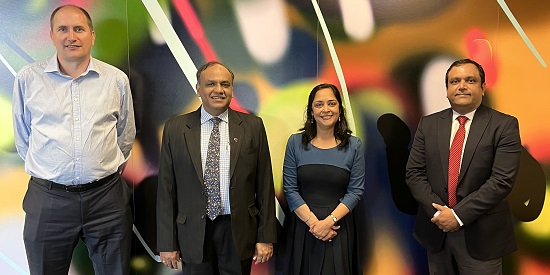Indian business leaders visit to expand internship opportunities
Media release
Leaders of India's largest business and industry body, the Federation of Indian Chambers of Commerce & Industry (FICCI), have visited Deakin as part of an innovative new student internship initiative aimed at increasing bilateral relationships between Australia and India.
The initiative is well-timed with the signing of the India Australia Economic Cooperation and Trade Agreement at the beginning of April.
FICCI Deputy Secretary Mr General Manish Singhal and FICCI Director Mr Gaurav Vats met with Deakin Business School senior lecturer Dr Ameeta Jain, who is leading the internship program, alongside team members Professor Alex Newman and Associate Professor Harsh Suri.
The initiative - funded by Australia's Department of Foreign Affairs and Trade (DFAT) under the auspices of the Australia-India Council - aims to foster industry-university partnerships in Australia and India by offering 'virtual internships' across both countries.
Students are matched with organisations and undertake cross-cultural work focussed on the United Nation's Sustainable Development Goals, developing skills in the growing area of corporate social responsibility.
So far 32 students have completed internships in India and Australia, working on projects at NGOs in both countries, including the United Nations Association of Australia, and the Centre for Social Sensitivity and Action at the Goa Institute of Management in India.
FICCI is a major supporter of the initiative, which includes online masterclasses for its 250,000 member organisations to learn more about the internship program, and how it can help them integrate Sustainable Development Goals into their business models.
The long-term objective is to grow student internship opportunities with a larger range of member organisations.
Dr Jain, who is of Indian background, said she was excited to facilitate better connections between Australia, her adopted country, and India, her country of birth.
"Our aim is to build pathways for students to study and work across both countries, to develop and share work-ready skills," she said.
"By offering the internships virtually, students have access to a wider range of opportunities, and the flexibility of delivery is critical for students looking to get meaningful work experience in a post-pandemic world.
"Students also receive valuable skills in cultural awareness and development, how to talk to, and work with, people with a different background to their own."

